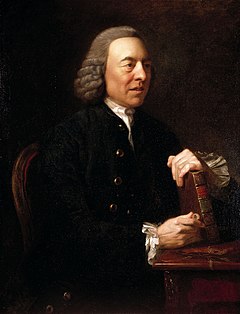Benjamin Stillingfleet
| Benjamin Stillingfleet | |
|---|---|

Stillingfleet by Johann Zoffany, RA
|
|
| Born | 1702 Wood Norton, Norfolk |
| Died | 15 December 1771 Piccadilly |
| Resting place | St James's Church, Piccadilly |
| Nationality | British |
| Occupation | Author |
| Known for | the source of the phrase |
Benjamin Stillingfleet (1702–1771) was a botanist, translator and author. He is said to be the first , a phrase from which is derived the term now used to describe a learned woman.
Benjamin Stillingfleet was born in Wood Norton, Norfolk in 1702 to Mary Ann and Edward Stillingfleet, a physician. He was one of four children, but the only son.His grandfather, a Bishop, had died in 1699, but left no money to Benjamin's father as he disapproved of his father's opinions and his marriage to his mother. He was educated at Norwich School before obtaining a B.A. at Trinity College, Cambridge in 1723. He failed to become a Fellow, partially because of the influence of Richard Bentley, Master of the college, who considered it a shame for a man of Stillingfleet's range of talents to 'be buried within the walls of a college'. He served as a tutor to bring in income. He was tutor to his relative William Windham at Felbrigg Hall and he taught him from the age of seven to twenty. He then set out to accompany William Windham on the Grand Tour returning several years later in 1742. Whilst in Switzerland they had organised over several winters a set of pantomimes using other "tourists" as cast helpers and audience. Stillingfleet was in charge of the music and the scenery. This group was known as the "Common Room". During the summers the same group would set out on scientific explorations finding the undocumented glaciers of the Alps.
Finally they returned to England, Stillingfleet, now out of work, was awarded a pension of 100 pounds per year for the next seven years by the Windham family. This gratitude was not entirely undeserved. Windham was to become a Fellow of the Royal Society in 1744 based on the explorations that he, Stillingfleet (and others) had made of glaciers in Switzerland and his mathematical abilities which Stillingfleet had tutored.
Stillingfleet was again noted for his contribution when William Hudson FRS was lauded for his publication of Flora Anglica in 1761, said to be the first application of Linnean principles to botany in England. Others however have pointed to Stillingfleet's earlier work as the first. Stillingfleet also published a Calendar of Flora (1755) based on the observations of Theophrastus. It was an early formalization of the study of plant phenology and based on Linnaeus' promotion of the idea of natural calendars.
...
Wikipedia
